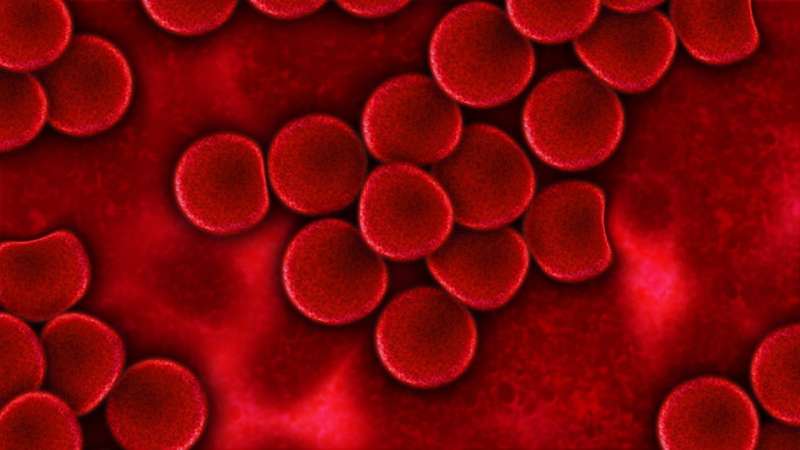This article has been reviewed according to Science X's editorial process and policies. Editors have highlighted the following attributes while ensuring the content's credibility:
fact-checked
trusted source
proofread
Researchers identify new biomarker in quality of blood donations

A collaborative cohort of researchers, led by University of Colorado Anschutz Medical Campus professor Angelo D'Alessandro, has identified kynurenine as a critical new biomarker in the quality of stored red blood cells (RBCs), a crucial step in the development of more personalized transfusions. The study results appear in the journal Blood.
The transfusion of RBCs is one of the most common in-hospital medical procedures, second only to vaccination. The blood supply is dependent on altruistic blood donors, and donated RBCs are stored in blood banks for up to 42 days until transfusion. Defining and characterizing the criteria for qualifying RBC storage is an underexplored component of transfusion medicine, and the quality of stored RBCs is critical for a successful transfusion. Time is a factor, as the effectiveness of RBCs wanes the longer they are stored. In their study, researchers explored how various biomarkers, such as donor age, sex and BMI, make a difference in the storage of blood.
Results indicate that blood with high levels of kynurenine, a metabolite that plays a critical role in immune response predominantly found in participants with high BMI, male donors and older female donors, is a marker of fragility, which impacts the cells' susceptibility to rupturing. Blood with higher levels of kynurenine is more likely to break down faster. When classifying blood units based on the levels of this new biomarker, researchers discovered that the quality of blood is dependent on donor traits just as much or more so than the time it was stored in the blood bank.
"Blood transfusion is the cornerstone of modern medical practices, with more than 100 million units used per year in life-dependent and life-saving circumstances," says D'Alessandro. "Our research underscores the potential of personalized transfusion medicine. By focusing on kynurenine as a marker, we can better understand and predict the quality of stored blood, tailoring transfusion practices to individual patient needs."
Dr. Kirk Hansen from the CU Trauma Research Center added, "Blood transfusion is a key life-saving intervention for millions of military and trauma patients in the US every year."
This study utilized a shared biobank and database from the Recipient Epidemiology and Donor Evaluation Study (REDS-III), a comprehensive, multi-site initiative aimed at improving the blood transfusion process. Researchers were able to analyze cellular data from a diverse pool of more than 13,000 donors, nearly 700 of whom were called back for a second donation.
Providing additional support, the researchers leveraged a population of over 500 different mouse strains, each with unique genetics and biology. This approach allowed researchers to more broadly understand how metabolic changes contribute to the longevity of blood.
"For the first time, we link kynurenine levels and genetic traits that regulate them to outcomes in almost 5,000 transfusion recipients, a remarkable connection that highlights the impact of donor-specific traits on transfusion efficacy," says Travis Nemkov. "Studies like this are critical in ensuring a sustainable future in transfusion medicine, determining biomarkers that indicate which blood would be more effective, as scarcity continues to be a problem for millions of patients who rely on transfusions.
"Interestingly, we're now also observing comparable signatures in instances of extreme physiological stress like ultramarathon running, which causes similar RBC damage. Making these connections illustrates another utility in studying the blood donor population and we look forward to our future work in this space."
More information: Travis Nemkov et al, Regulation of kynurenine metabolism by blood donor genetics and biology impacts red cell hemolysis in vitro and in vivo, Blood Journal (2023). DOI: 10.1182/blood.2023022052


















